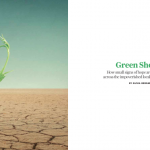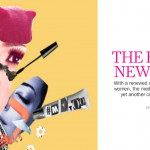Reporting on the elusive Toronto Sun editor
It’s the final weekend of production for the Ryerson Review of Journalism magazine, and we’ve yet to hear from Adrienne Batra. My fact-checker and I are coming to terms with the reality that we might not hear from the editor-in-chief of the Toronto Sun to complete the fact-checking process since I first interviewed her in January, three months prior. I wasn’t getting any calls, texts or emails back. So we resorted to another plan.
We, again, pored over audio recordings to fact-check my entire 5,000-word profile on Batra, instead of the typical fact-checking calls that are part and parcel of the RRJ process. It was less than ideal, but with someone as difficult to reach as Batra, I was thankful I was able to meet her in the first place. The whole experience seemed to confirm the Sun’s reputation for a lack of accountability.
For my magazine feature, I shadowed Batra for five hours on Jan. 17 to get to know the person behind the Toronto daily, notorious for its disregard for factual reporting and constant evasion of the consequences of its work. In the near half century since its first issue was published in the early ‘70s, the Toronto Sun has been consistently accused of homophobia, racism and more. While its content has shifted away from eugenics and blatantly anti-gay commentary, the newspaper still regularly publishes hostile rhetoric against immigrants, refugees and Muslims.
To obtain as much insight and personal background on Batra as possible, before and after she and I met, I talked to Canadian journalism pundits, including both critics and fans of the Sun, an expert on the history of the Sun, various Sun columnists and editors, members of the National NewsMedia Council as well as numerous friends, colleagues and peers of Batra’s.
I also obtained archived newspaper clippings of reporting on her student politics era from the University of Saskatchewan’s student newspaper the Sheaf, and read numerous books and pieces about Batra’s personal life, about the Sun and her employment trajectory — back to deceased Rob Ford’s mayoral era and the more recent rumour about goats being slaughtering in a Toronto hotel published in the Sun’s pages. I did as much as I could to gain more insight into my elusive profilee.
As for talking to the chief herself: Batra knows how the Sun is perceived. So, nabbing an appointment to shadow Batra in the first place took months of convincing emails and phone calls. So I wasn’t surprised that when she agreed to meet me, the window of access would be short-lived.
Batra was loud, enthusiastic and self-driven — but unsurprising. She hasn’t done much to shift the editorial direction at the Toronto Sun, and never intended to. Instead, she sees the Sun as the place that will always be willing to publish unpopular, mostly right-wing, opinions like those of columnists Tarek Fatah or Sue-Ann Levy.
The chief chalks up criticism of viral columns accused of racist and violence-inciting content as “critics of the Sun” — who she tells to “get in line.”
However, there’s more to Batra’s presence than simply maintaining the controversial daily. She also represents a milestone in the movement for women in leadership positions in journalism — and on top of that, women of colour in leadership positions generally.
Batra was the first woman of colour named editor-in-chief of a major metropolitan newspaper in North America, in 2015. It was a step forward for ongoing newsroom diversity demand, but went largely unnoticed. Regardless of how many BuzzFeed, Vice, Canadaland and other publications’ journalists might feel (and tweet) about Batra, she is unapologetically herself, setting aside the ideological box that people of colour are constantly associated with — an ideologically leftist and pro-affirmative-action one.
As HuffPost Canada editor-in-chief Andree Lau told me: “Just because someone is an immigrant to Canada or comes from an immigrant background does not automatically make them Liberal supporters or make them lower-case-liberal.”
“Whether you agree or disagree with her, she’s a representative of how people should stop thinking that journalists of colour are monoliths or even that Canadians of colour are monoliths.”
The profile, Driven, dives deeper into these topics. It also takes readers into Batra’s world, something I was able to do because of the five hours I spent shadowing her. That, too, was a challenge, and I carefully calculated when to challenge her and when not to — because without hearing her out, I thought we really can’t pinpoint how to demand she do better.
Read Driven on the Ryerson Review of Journalism website.
Editor’s note: J-Source editor-in-chief Sonya Fatah is an instructor at the Ryerson Review of Journalism and was Driven’s handling editor.
Sarah Krichel is The Tyee’s social media manager.




